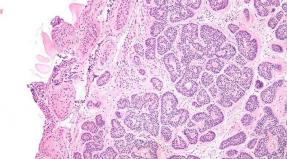Why little menstruation. Scooty periods - within the norm, relative deviations, obvious pathologies. Characteristics and features of the disease
Menstrual bleeding are a normal phenomenon for female organism. Any deviations in this process may talk about violations of the body systems. They cannot be ignored. Scooty periods can be caused by a variety of factors: some of them can be considered quite natural, the others belong to pathological factors. Why is there a little allocations in critical days? Normal states include the following statements:
- If a girl is 12-15 years old and this is the first year after Menarche.
- The woman reached the age of 40-45 years old.
- Scooty monthly brown color appeared in the first months after pregnancy during lactation.
These are the main natural reasons that can explain the emergence of non-delicate discretions in critical days. But quite a lot of diseases and failures in the work of the body are able to lead to a similar result. Only a gynecologist can establish the cause of this phenomenon. It is practically impossible to understand yourself why monthly steel has become almost impossible.
Only full-fledged diagnostics can reveal the causes of this phenomenon.
What is considered the norm?
By how men in the woman go, it is possible to conclude about the state of its reproductive health. If the girl wants to get pregnant in the future, to carry a safe and give birth to a child, it must be alened, if we usually have a weak, osculus or less abundant bleeding with regular bleeding.
Normal menstruation
In order to control your menstrual cycle, a woman must keep a diary. It specifies the days of starting regular bleeding, its duration and nature of the selection. This will quickly track deviations from the generally accepted norm. A woman from 15 to 40 years old menstruation should be approximately like this:
- Painless or insignificant discomfort regular bleeding.
- The duration of the menstrual period is 28 days (deviation is allowed in a large or smaller side of 7 days).
- Menstruation lasts 3-7 days.
- Allocations are abundant. Their number reaches 50-150 ml.
Monthly without blood in the composition of the secretions that have a light brown shade, most often it is bad for reproductive health and is considered pathology. But sometimes such a phenomenon causes quite natural causes.
Age
Age can be a natural reason why bleeding are poorly and do not correspond to generally accepted canons:
- If a girl is only 12-15 years old and this is the first year after Menarche, a similar picture is quite typical. This is a frequent phenomenon. During the first 6-12 months, menstruation is only being established. The hormonal system is in the active period of becoming. Therefore, menstruation go less or less than an adult woman in childbearing age. However, if a year after the first monthly cycle did not work, it is necessary to make an appointment with the doctor. This may be a sign of deviations.
- Scooty periods can be considered the norm at the age of menopause. She comes to 40 years. If regular bleeding steel is less than the duration, their abundance decreases, it means that the woman comes into the age of menopause. This is a natural, natural process.
However, even at the age of 40 years it is worth alert, if there are no regular bleeding for about a year, and the selection appeared through quite great gap time. This may indicate serious diseases.
Pregnancy

A pregnancy may be a completely natural reason for this phenomenon. If, after the intended date of critical days, menstruation has not begun or manifested itself with scargoing allocations, it may have occurred. If there are no more than a day, they are scarce and light, it can be considered the norm.
However, during pregnancy, any selection should be recorded and discussed with a gynecologist.
The cause of such a phenomenon may be pathology, for example, insufficient level of progesterone. This speaks about the threat of miscarriage. Therefore, when such symptoms appear, it is necessary to urgently apply to the hospital.
After pregnancy, scanty periods are rather common. The reproductive system restores its childbearing. Soon the woman will be able to get pregnant again. If small allocations go during the lactation period, it is necessary to undergo a survey. But most often it is a completely natural manifestation of the body's work.
Deviations from the norm
If the woman of the childbearing age (15-40 years) noticed that this time usually normal periods are not enough, it is possible to suspect deviations in the work of the body. Diagnosis is engaged exclusively at the attending physician.
Symptoms
If the woman discovered that she has very scarce periods, less than 50 ml, it should turn to his gynecologist. This state may be accompanied by certain symptoms. The following manifestations are as follows:
- Pain in lumbar Department, as well as lactic glands. Some women have a painless process.
- Strong spasms at the bottom of the abdomen.
- Constipation or, on the contrary, the manifestation of diarrhea.
- Headache, nausea.
This condition is called dealerships. It becomes the cause of infertility under the age of 40. Hymanorerian is the primary manifestation when the girl never had normal monthly, and secondary, for example, appears after pregnancy. If scanty periods go every cycle, it is considered a serious deviation requiring a specialist consultation.
Diagnostics

The reasons for scanty menstruals can be established only after consulting from their female doctor and passing a number of surveys. The gynecologist should initially establish for what period such a state appeared is primary or secondary hymenophone. It is important to determine whether the patient is pregnant or scanty monthly manifested with her after pregnancy.
After inspection, the woman gives a smear for infectious diseases, Uzi ultrasound, ovaries. Be sure to surrender general analysis Blood, and also determines the level of hormones. When conducting a survey, the thickness of the endometrium layer is estimated, the operation of the ovaries. Only after the listed manipulations, a medical specialist finds the cause of deviations. It is extremely important, especially during pregnancy, do not postpone the visit to the gynecologist.
Causes of deviations

If a fair sex at the age of 15 and 40 years has identified certain deviations in the reproductive system, they may be provoked by a number of reasons. They can provoke both diseases and interventions of various kinds in the body. These include:
- Infectious diseases.
- Hormonal deviations (including contraceptives caused).
- Tompetions (polyps, cysts, cancer, etc.).
- Abortion.
- Tuberculosis of female genital organs.
- Genetic predisposition.
- Stress, elevated loads.
- Wrong lifestyle.
Scooty periods that are caused by deviations and failures in the work of the body are most often explained by the reasons listed above. However, this is not full list. Therefore, without consultation, it is impossible to do with a specialist.
Infection
Sex infections that are accompanied by itching, burning, unpleasant odor, Pain at the bottom of the abdomen or during sexual intercourse is able to cause hymenorem. Such diseases include chlamydia, ureaplasma, tuberculosis, syphilis, gonorrhea and many other pathogens.
Their treatment is necessary, otherwise the consequences will be sad.
Hormonal deviations

The imbalance of female sex hormones most often causes the deviations of the menstrual cycle in women under 40. In addition, the hormones of the thyroid and pancreas, which are in the wrong concentration, are able to cause hymenorem. Treatment of such diseases is carried out by a gynecologist in conjunction with the endocrinologist.
Also, the reception of hormonal contraceptives is able to cause scarce periods. In this case, the hormonal intrauterine helix or oral preparations stop the reproductive function of the body.
If, after their cancellation, menstrual bleeding is not restored, this pathology requires treatment.
Surgical intervention
Scraping for diagnostics, interrupting pregnancy, removal of polyps and other operations may cause endometrial development violations. It also contributes to hormonal violations. In the case when similar facts are accompanied by signs of inflammation (high temperature, pain, burning in the vagina, etc.), it is necessary to urgently carry out appropriate treatment.
Genetic predisposition

Some representatives of the beautiful gender monthly periods can be predisposed genetically. In this case, the next relatives have the same picture. This is not a pathology, only if the women of this family can become pregnant without problems.
Stress, load
Incorrect lifestyle, frequent physical and emotional loads are able to manifest itself in the form of hymenores. Even strong emotions or moving sometimes affect the women's reproductive system.
Frequent diets, lack of vitamins in food also cause a similar phenomenon.
Leading healthy image Life, adhering to the day of the day, experiencing positive emotions, a woman can prevent pathology in the future. If problems have appeared with menstrual cycleIt is necessary to reduce the burden on the body. Otherwise, the consequences will be very serious.
Carefully and carefully belonging to your health, every representative of the fine floor can avoid serious ailments. The body signals various deviations in its operation. Carefully listening to them, you can save ourselves from the consequences in the future.
Regulated (menstruation in Latin) - the result of the correct operation of the reproductive system. Since puberty and to the attenuation period of the childbearing function (), monthly bleeding is normal and mandatory for a healthy organism. Exception of this rule - a period of pregnancy and breastfeeding. The physiological concept of the norm in medicine is relative, so women may have a few character of the menstrual cycle. But there is a certain face, after which the scarce periods become a symptom of abnormal processes. We will consider detail the reasons for this phenomenon (natural and pathological), and learn what to do in situations when such states arise.
The concept of hymenorelia
Very meager monthly (either brown, normally painted or pink discharges) can be defined as physiological or pathological only, provided that they are considered in aggregate with other signs. For example, some women have a genetic predisposition to such a phenomenon, while there is no other symptoms and there are no problems with conception and having a child. There are still a number of states at which there are no abundant periods - this is normal. Therefore, to begin with, consider the upper and lower boundaries of the norm in relation.
Every month, each woman of childbearing age begins "critical days." This is the result of rejection of the surface layer of endometrial in the absence of conception. The entire cycle is controlled and regulated by hormones, whose balance changes during the growth and ripening of the egg, ovulation and at the time of breaking the non-advocated egg. The last stage is the rejection of the surface endometrial layer, which increased during the preparation period possible pregnancy. As a result, menstruation starts, and the hormones "run" the next cycle.
The concept of the physiological norm goes the menstrual cycle, which:
- lasts 28 days (plus-minus week);
- is stable, that is, bleeding begins on time (plus-minus one or two days situationally);
- deeps a certain amount of blood from the body: during menstruation allocated from 50 to 150 ml, they have a natural color (exception: the first or last day, when there are few menstruation, they are "Majut", selection can be brown);
- lasts at least 3 and no more than 7 days;
- does not bring strong painful sensations (there are periodic small pulling pain at the bottom of the abdomen, which may be a little "give" to the lower back, such a state causes discomfort, but does not require anneasiating).
Such signs are considered natural, it means that the body functions normally. If any sign does not match, then we can talk about certain deviations:
- - blood is allocated less than 50 ml over the entire period;
- - absence of menstruation;
- - The period of bleeding is 1 - 2 days.
Any of the listed features can be both the norm and pathology. Unstable monthly can be observed:
- during puberty;
- as a result of the attenuation of the reproductive function: at the moment there is a hymenia, during - amenorrhea. IMPORTANT: Poverty after 40 is considered a natural sign only provided that there is a gradual decrease in the level of hormones and attenuation of the childbearing function. If there is no menstruation for more than a year, and then suddenly appeared scarce brown allocations, it is a reason to turn to the gynecologist. With menopause, no discharge should be;
- during pregnancy: at the very beginning, the periods are dark scanty, they can be caused by natural causes (for example, if two eggs were fertilized, and only one was strengthened in the uterus). Or pathological (happened in the threat of miscarriage);
- during the lactation period: Normally, the menstrual cycle is renewed only after the end of feeding, but if the milk is small, then periodically periodically follow menstruation.
The above cases are natural reasons that are not grounds for any medical manipulations.
So, what kind of hymenoneum, we looked at. Quite often it happens that it is accompanied by another symptomatics. If this happens, the condition is called pathological. Consequently, you need to look for the cause of this phenomenon. We learn what additional symptoms should be alarming.
Accompanying symptoms
Any change in the nature of the menstrual cycle without objective causes is a signal of any process in the body. If monthly steel has become less abundant in women over 40 - 45 years, this may indicate the attenuation of the reproductive function. But there are cases of early climax, so similar symptoms may appear at 35 years. With active sexual life, weak monthly can talk about the coming pregnancy.
If the monthly becomes less than usual, and this phenomenon is observed for several cycles, it is worth contacting the profile. But there are cases when there is no time to observe the dynamics. Additional symptoms require immediate survey. To the gynecologist should apply immediately if:
- appeared or stretching pain at the bottom of the abdomen, in the lower back;
- beginning chest (or previously experienced discomfort sensations);
- menstruation is accompanied by intoxication (nausea, vomiting, increase in temperature);
- there are constipation or diarrhea.
The following changes should also be alert: bleeding has become short (usually the hymenonese and oligomenorrhea accompany each other), the shade has changed (allocations are weakly painted or darker), appeared nasty smell. Any of these symptoms (separately or together) is a serious basis for survey. Consider the main reasons that can provoke such changes.
The reasons
On the natural reasons for changing the nature of menstrual bleeding has already been mentioned. If the usual long and abundant discharge was replaced with short and minor in women 40-45 years old, became irregular, then this testifies to the start of premenopause. During the period of hormonal restructuring of the body caused by the attenuation of a childbearing function, unstable menstruation may be accompanied by a number of symptoms characteristic of the menopausal period (tides, sweating, nervousness, etc.).
In women of reproductive age, such changes can talk about pregnancy, if the test is negative, you need to look for other origins. In the period of puberty, menstruants are not attense, the cycle is unstable, the selection of meager (sometimes simply "drip"). This is naturally at the beginning of the formation of a reproductive function, when the process is only started, and the balance of hormones has not stabilized through the phases of the cycle. But if for six months a year, critical days proceeded in accordance with the physiological norm, and then suddenly destabilized, you need to check why menstruation became scarce.
When taking OK ( oral contraceptivesHormones containing) is allowed a small reaction of this kind at the very beginning. Reception of contraceptives will definitely affect the balance of hormones. Therefore, minor changes in the first and second month are allowed. If there is a persistent decrease in the number of menstrual blood, it is necessary to consult with the gynecologist. Perhaps the selected contraceptive means are not suitable and you need to look for an alternative.
Blood may be missed in the first and last day when using intrauterine spirals, it is usually accompanied by a small cycle lengthening, for example, instead of 5 days, bleeding lasts 6 or 7. This is also the norm, since foreign body The uterus can slightly reduce its tone and requires more time to completely eliminate the body of the superficial endometrial layer.
Non-human periods may appear against the background of stress, excess physical exertion, long starvation, obesity or anorexia. If, as a result of a diet or under the influence of a stressful situation, monthly periods were less scarce than usual, there are no reasons for concern. But if the changes have become systemic, you should consult a doctor.
Causes of scanty monthly brown can be pathological. When some diseases are developing, scanty discharge with a changed, darker color, indicate problems. Especially if accompanied by the corresponding symptomatics (see paragraph). It is worth knowing in what cases should be reacting immediately to similar phenomena.
During pregnancy
The period after fertilization is usually characterized by complete, but sometimes they can "smear". This may indicate:
- on the insufficient work of progesterone, which provokes partial density of the endometrium. If this option was one-time (immediately after conception), then there is no danger, the body just did not have time to rebuilt until the end. But with a positive test and confirmed pregnancy, there are constantly emerging mestructures - a symptom of threatening, there is a risk that, together with the endometrium, the fruit will be rejected and miscarriages;
- about ectopic pregnancy: this pathological condition is very dangerous, since there is a risk of various complications (up to the rupture of the uterine pipe, peritonitis and death);
- on the threat of miscarriage on the background of the overaction of androgens: such hormonal deviations are found;
- on the abnormal development of the fetus (in particular, about problems with its consolidation in the uterus), which can also provoke a spontaneous abortion;
- about double fertilization: a woman can mature at the same time two eggs, one of them fixed normally, the second - with deviations, as a result there is a risk of rejection.
With any bleeding, even scant, minor and painless, you should contact a profile specialist to identify the cause of this phenomenon. Nonally, timely appeal allows you to keep the fruit, and ignoring the alarming symptoms leads to spontaneous abortionthat is especially dangerous in the early and later dates. And hereinafter - to serious complications in the form of violations of hormonal balance and infertility.
After childbirth and during feeding
Immediately after childbirth, with normal lactation of menstruation, it should also not be. Scarce bleeding immediately after the birth of a child is not monthly, but the removal of the remnants of the placenta and blood clots (formed after the breaking of the vessels). Such a phenomenon can be observed within 7 - 14 days, in the future it indicates pathology (infection, inflammatory process or damage to the uterus).
With non-bleeding is a sign:
- restoration of the normal cycle (with a decrease in lactation level, the hormonal background changes, "blocking" is removed on the ripening of the egg, which was caused by prolactin);
- reactions to stress: Against this background, the amount of milk can sharply decrease, which will give the body to the end of feeding.
Diseases
Mebly menstruation - a sign of a number of pathological processes. And this is a serious reason to pass the survey, since timely identified diseases are easier to tremble, and in the future they do not give serious complications. Immediately you need to visit the doctor when an additional symptomology appears, which speaks about the presence of an inflammatory process.
The abnormal periods are symptom:
- with endometriosis, endometritis, polyps, hyperplasia, ovarian dysfunction and other systemic inflammatory diseases of reproductive organs;
- in case of benign and malignant tumors (mioma, polycystic, cancer);
- little blood during menstruation occurs with various infectious, fungal, venereal diseases: gonorrhea, chlamydia, syphilis, candidiasis, etc.;
- hymanorery can develop on the background: tuberculosis of the uterus and ovaries, systemic endocrine diseases, anemia, hypovitaminosis.
Also, the body can respond to stress and physical overload, serious mental deviations, abortion (medical or spontaneous), bad habits and influence of external factors (irradiation). The long-lasting intake of drugs (hormonal and non-coronal), work on chemical production or chemotherapy, partial removal of the reproductive system or their underdevelopment, injury, operations on small pelvis organs (urinary system) is affected. As you can see, pathological reasons are quite a lot, therefore their timely identification and treatment is necessary.
After scraping
Abortion (drug, vacuum or surgical) can cause deviations. In this case, it is worth paying attention to the concomitant symptoms: soreness or pronounced spastic pain, unpleasant odor, temperature increase, the appearance of bunches indicates an inflammatory process. It develops as a result of incomplete removal of the fetus, an oily-free shell or an infection attachment. Immediate hospitalization and re-cleaning required. After the measures taken, the normal menstrual cycle can be recovered for several months (but not more than 3). If scanties continue, the cycle is unstable, the oligomenorous is noted, then it is necessary to undergo a survey to detect the causes of such changes.
Diagnosis and treatment
Treatment begins only after a series diagnostic eventsSince this symptom is characteristic of a variety of pathological conditions. If the monthly proved to be scarce as a result of physiological reasons (we all examined them), it turns out at the stage of the survey and inspection from the gynecologist. In other cases, it will be necessary:
- suppose blood test (common, hormones, oncomarcresses);
- study of smear (including Baktposov);
- complete instrumental examination: colposcopy, ultrasound, tomography;
- laboratory study of materials taken (scraping, biopsy);
- basal temperature control.
When all the necessary diagnostic procedures are passed, and the cause is detected, the treatment of hymenoreliament begins. Tactics are selected in accordance with etiology. If pathological reasons are not detected, vitamin and mineral complexes are recommended, modes change, power correction, soothing drugs. Additionally, massage, physiotherapy, aromatherapy can be used. Helps in such cases treatment with folk remedies:
- herbs, infancy and fees that can stabilize the cycle are selected;
- paths are prescribed, mud;
- gironotherapy can be used.
Important: All unconventional techniques choose a doctor. Only a specialist based on the results of the survey can choose the correct patient tactics. Self-medication in this case will be ineffective, in worst - will lead to various complications.
If weak periods are caused by a certain pathology, then it is not necessary to treat it, but its cause. Depending on the etiology, the course of therapy or surgery is selected:
- in hormonal changes: treatment of systemic diseases or stabilization of hormone balance in the body;
- with inflammatory and infectious diseases: antibacterial, antimicrobial or antifungal therapy, aimed at eliminating the focus of infection and the causes of inflammation;
- for gynecological diseases: tactics in accordance with the diagnosis and stage;
- when identifying tumors (benign or malignant): Surgical removal or other tactics (according to indications);
- in pathologies of other organs and systems: consultation with specialists and systemic treatment.
As you can see, in the case of the identification of pathology, it is primarily eliminated. That is why, when changing the nature of bleeding, it is important to consult a gynecologist in a timely manner for differential diagnosis. This can only be accurately determined, with which the patient faced with a natural process or symptomatic disease.
Scarce periods can be in girls who only come into puberty. But for older women, it can talk about a possible disease. Treatment is appointed depending on which reasons led to this violation.
During one menstrual cycle, a woman loses from 50 to 150 ml of blood. Any deviation from the norm suggests that any functional disorders or disease. When there are no monthly monthly, little blood stands out, the woman needs to consult a doctor for medical help.
Hymenarya is an insufficient amount of blood discharge during menstruation that do not correspond to the norm. Such a disruption of the menstrual cycle can be combined with a decrease in the duration of menstruation (less than 3 days), and may also be a predecessor of the complete absence of menstruation (amenorrhea).
The main reasons for meager discharge
The reasons why little blood is allocated during menstruation, there are several. All of them can be divided into two groups:
- Physiological.
- Pathological.
TO physiological reasons include hormonal restructuring. It may occur in girls when they only have a menstrual cycle. Also, the cause may be lactation or a decrease in the reproductive function of the body as a result of Klimaks.
TO pathological reasons Believe:
- sharp change in body weight (weight loss or obesity);
- anemia and lack of vitamins in the body;
- strong physical exercise;
- , Psychological diseases and overload.
The female organism is very prone to change. If a woman constantly feels fatigue, is in the stressful situation and in voltage, the fertilization function itself is suspended. Physiological reasons:
- injuries of the genital organs and the urinary system;
- various inflammatory processes and diseases;
- hormonal contraceptives;
- defective nutrition;
- the disease of the thyroid and endocrine gland;
- inxication with strong poisoning.
Symptoms of scarce monthly
Little secretions during menstruation is the main symptom of the hymenoreliament. In this case, the duration of the cycle may remain the same or reduce. In addition, other symptoms may occur, which are accompanied by poor selection:
- pain in the head and dizziness;
- nausea;
- unpleasant painfulness in the chest;
- And at the bottom of the abdomen;
- bleeding from the nose;
- weakness;
- constipation or diarrhea;
- reducing sexual waste (arises as a result of reducing estrogen levels).
Read also 🗓 Selection after hexicon
The selection will have a separating character, as a rule, they are brown or brown. Reducing the amount of selection is not always accompanied by additional symptoms. Therefore, it is important to immediately consult a doctor in the event of such a phenomenon.
In what cases is a small amount of discharge
Mebly menstruation can also be a normal phenomenon and do not cost anxiety.

With the normal functioning of the body, there are several reasons for minor selections:
- In girls in the first two years of the formation of the menstrual cycle. The female hormonal background is formed for a long time, and during this period, menstruation may be delicent and with different duration. In this case, it is not necessary to worry about it is a normal phenomenon. If the cycle exceeds the norm, this may indicate the underdevelopment of the genital organs.
- Before the climax. Female sexual activity after 45 years is reduced, as a result of which the production of hormones decreases and the menstrual cycle changes.
- Heredity. This feature is found when a slight blood release during menstruation is the norm. Such a feature is transmitted from the grandmother to the mother and from the mother to the daughter. It is not displayed for the opportunity to have children.
- Postpartum state. After childbirth, the body is restored, therefore, they may occur both abundant periods, and their insignificant manifestation. When breastfeeding, scanty discharge is considered the norm and do not require excitement.
When you need to consult a doctor
Any manifestation of deviation from the norm may cause a goal to a doctor who is able to determine the cause based on the following points:
- poll and examination of the patient;
- bacteriological sowing;
- determination of hormone concentration;
- biopsy;
- measurement of basal temperature during the menstrual cycle.

To the specialized doctor should be treated in the case when a sharp reduction in blood discharge in a woman of childbearing age occurred. In this case, the doctor will be able to determine the main reason and appoint proper treatment. Also, you should not postpone the campaign to the doctor who stopped breastfeeding, and the menstrual cycle did not recover.
With the disease of the endocrine system and thyroid gland Consultation of a doctor is also required. It should be remembered that the endocrine system will rate the absence in the life of stress and the presence of positive and pleasant emotions.
Treatment of pathology by medication
Scooty discharge during menstruation, which is caused by pathologies in the body, require professional intervention. The examination and treatment must appoint a doctor. The patient is recommended for laboratory tests, according to which the gynecologist determines the cause of the body failure in a woman and prescribes the drugs necessary for treatment.
Read also 🗓 Cotton allocations in women
First of all, it is necessary to do ultrasound ultrasound and ovaries. If problems with the normal functioning of the internal secretion glands were discovered during the survey, then the patient needs to pass hormonal therapy. Thanks to this therapy, the menstrual cycle will return to normal, and the ovarian robot is normalized. During treatment, the amount of selection stabilizes.
The choice of drug drug depends on what concentration of hormones in the patient in the patient. Based on this, the gynecologist appoints estrogen or progestin. The duration of the course can be from three to six months.
Interesting! You can restore the menstrual cycle using hormonal contraceptives that are selected individually for each woman.
Hormonal background will help restore and preparations, which contains substances of natural origin. This, for example, medicines such as Estrovale and Qi-Klim.

With a regular observation of a woman of minor discharge during menstruation, the gynecologist disclaims the patient of vitamins that can support general state organism.
If the cause of the disease is that there is an infection in the body, then in the first place it is necessary to treat the source that provokes it. In this case, the doctor discharges various anti-inflammatory drugs or antibiotic drugs.
For painful feelings During menstruation, gynecologists prescribe special medication drugs that are able to remove pain. These are such analgesics as analgin, but-shp, Spasmalgon, Papaverin, Baratgin or took.
Popular Medicine with scarlet menstruation
Not always to reduce menstrual discharges should be treated with drug drugs. For example, with a sharp weight loss, the doctor simply recommends the patient to balance its nutrition.
Women's health and her hormonal background depends on proper nutrition. The diet should include products that are saturated with all necessary and useful substances. Protein can be found in bean, meat or fish. Vegetable oils Sounded the body with fat, and cereals - complex carbohydrates. Vitamins and antioxidants can be obtained by eating every day fresh fruits.

Since stress is the main source of the occurrence of hymenoreliament, it is necessary to deal with it. If it does not work independently, it is recommended to contact a specialist for help. After passing treatment, emotional and psychological conditionThe reproductive system is restored and, as a result, the duration of menstruation is normalized.
Often in women's consultation from women of all ages, you can hear the same question: why during monthly scarce allocations is good or bad? When a problem with menstruation arises, a woman, first of all, should appeal for medical care, as this may be a characteristic feature of deviation in the functioning of the body.
Causes of hymenoreliament
 To find out: "Why are scanty periods?", You should contact for qualified help. If monthly go too weakly, gynecologists in most cases are diagnosed with hymenoorer. At the heart of the occurrence of the hymenoresis is a violation of the work of the pituitary gland or ovaries, directly responsible for the settlement of the menstruation function.
To find out: "Why are scanty periods?", You should contact for qualified help. If monthly go too weakly, gynecologists in most cases are diagnosed with hymenoorer. At the heart of the occurrence of the hymenoresis is a violation of the work of the pituitary gland or ovaries, directly responsible for the settlement of the menstruation function.
The hymenorempions are nothing but a violation of the menstruation cycle, which is expressed in scarlet menstrual discharges with blood loss up to 50 ml, which does not comply with physiological standards.
In the hymenoreliament, bleeding is presented under the guise of drops or smears of blood, light, and sometimes dark brown. The small volume of menstruation is often accompanied by a reduction in the duration of the process of menstruation or its complete absence.
But this is not all the causes of certain violations. Probable sources of development of hymenorexia should be attributed:
- instability of body weight (sharp weight loss, obesity);
- disorders of the digestive tract;
- stress;
- injury and restoration of the urogenital system surgically;
- hormonal contraception;
- diseases of endocrine and thyroid systems;
- infection;
- toxins poisoning.
How to warn hymenoore?
 If a blood discharge They go bad, of course, are the indicator that a failure occurred in the body of the woman. Why there were deviations from the norm, a qualified specialist can say.
If a blood discharge They go bad, of course, are the indicator that a failure occurred in the body of the woman. Why there were deviations from the norm, a qualified specialist can say.
It is quite difficult to identify the source of the disease independently, and in this case it is contraindicated with self-treatment. So, if there was a problem with the menstrual cycle, you should immediately contact the gynecologist and go through a comprehensive examination.
As for the process of treatment of hymenoreliament, it is certainly impossible to say here, since each course is discharged according to the results obtained during the examination. If hormonal dysfunction is caused by external negative factors (stress, diet, etc.), most often prescribed vitamin complexes Hormone with hormonal drugs, as well as specialized antimicrobial agents. In the treatment of scant monthly, the excellent effect gives the reception of homeopathic drugs.
If, during the treatment of hymenoreliament, women arise:
- stress;
- apathy;
- frigidity;
a course of treatment at a psychotherapist visits should be supplemented.
Scooty selection is a deviation?
 When the end of the next menstruation cycle comes, the upper layer of the endometrium begins to reject, which is manifested in the form of menstruation. These bleeding, with the right functioning of the body, most often painless (sometimes weakly painful) flow within 3-5 days, with a cycle duration of 21 to 35 days.
When the end of the next menstruation cycle comes, the upper layer of the endometrium begins to reject, which is manifested in the form of menstruation. These bleeding, with the right functioning of the body, most often painless (sometimes weakly painful) flow within 3-5 days, with a cycle duration of 21 to 35 days.
During the period of menstruation, 50-150 ml is considered the norm of blood loss. If the indicators are reduced and bleeding is too small, it may indicate a hypoentic syndrome (impaired menstrual function).
If the periods are bad, this is the first signal of the body about any violations.
Symptoms of problems with menstruation
 As already mentioned above, the hymenonean is expressed in the fact that little blood is distinguished from the vagina, which may indicate certain deviations in the body of a woman.
As already mentioned above, the hymenonean is expressed in the fact that little blood is distinguished from the vagina, which may indicate certain deviations in the body of a woman.
If menstruation is bad, it may be accompanied by:
- headache;
- nausea;
- feeling of chest compression;
- lumbar pains;
- constipation.
Why should pay attention to these symptoms? The process of menstruation itself can pass against the background of strong pain in the region of the uterus and its intensive contractions. If you do not pay attention to the first signs, more serious health problems may arise. Often, the hymenoneum accompany bleeding from the nose and the woman does not understand why she needs to go to the gynecologist, and not to the ENT doctor.
A decrease in menstruation may mean that the body produces a small amount of etragona, due to which there is an imbalance in the work of the reproductive system of the body and the libido is reduced.
If the monthly go weakly, it is worth paying attention to the condition of the body. This question may occur at any time and accompanied by the following deviations:
- the usual rate of blood loss (less than 50 ml) is reduced, which is called hymenophone;
- the duration of menstruation (less than 3 days) is reduced;
- cuts menstrual rhythm;
- rare menstruation occurs (not more than 4 times a year).
40 years - for a woman frightening digit. First, many are afraid that the climax will come soon. Secondly, for some psychologically hard to move, a forty-year-old frontier. In physiological plan in the body of the woman also occur. First of all, this is due to the fact that the monthly becomes not so abundant as before. The representatives of the beautiful sex as signs of aging of their body perceive scarce periods.
But it is not necessary to dramatize so much. After all, everything is not so sad. But you need to understand problems with the menstrual cycle anyway.
Climax and pathology
In our article, we will deal with why women appear (reasons).
After 40 years of allocation can be not particularly abundant. There are several reasons for their appearance. However, climax and pathology are the most common.
It should be known that the menopacteric state comes to women usually in the fifty-year-old age. But all the features of the body are different. Therefore, an option is possible that some women will come earlier. Clearing Cleax is due to the fact that there are less female hormones in the body. Also to this age period Cell update slows down. This condition is a natural process for ladies. But some are very worried about this period. Since it is associated with emotional bursts, the woman changes the mood.

It can also feel the depressed, no one needed. In the period of menopause, women are advised to contact the gynecologist to assess their physiological and psychological health. Also, the specialist will give the necessary recommendations on the reception of medical drugs that will help restore the cycle.
After 40 years, the scarcity of menstruation is associated with the fact that the ovarian function is reduced. Climax comes nonresko. Initially comes menopause. This period can last from 2 to 8 years. Also changing the ripening time of the follicle. Therefore, the periods come not in time, the cycle is broken.
In addition to mestruation, abundant allocations may also occur during menstruation. But as a rule, the volume of menstruation is becoming less and less and goes into a masculine. Such discharges are accompanied by pain at the bottom of the abdomen. The basal temperature also rises. Add to this are added frequent urges To urination. The period of menstruation is stretched, instead of 3-4 days it lasts 6-7 days. It should be known that such symptoms are associated not only with the climax, but also may cause the inflammatory process.

Therefore, it is necessary to refer to the doctor for diagnosis. May be subjected inflammatory processes Small pelvis or the appearance of any formations.
Hormonal failures
If menstruation does not come completely, this suggests that hormonal changes are observed. In this case, when contacting a doctor, he prescribes the patient to pass the blood test. Also prescribes application hormonal drugsTo stabilize the female function of the body.
For a woman, an important factor is the passage of an annual inspection from a gynecologist. Since the state of health of the genital organs directly affects the mood of the girl and its emotional mood. Annual inspection will allow diagnosing a disease on early stage And appoint a woman effective treatment.
Endometriosis
There is such a disease as endometriosis. The essence of this disease is that the ferrous tissue of the uterus grows beyond its limits. When menstruation occurs, these plots of mucus are separated together with blood. Therefore, the selection becomes abundant. At the same time, they are accompanied by strong painful sensations. As a rule, the cause of endometriosis is abortions. Another characteristic of this disease is that the periods come irregularly.
Reproductive function and scanty periods
The reproductive period of women depends on the structure of its sex system. Each has its own definite amount of eggs that it can produce during life. This number is laid before her birth. Next they ripen throughout life. During each menstruation, one or two cells can ripen.

There are cases when they can mature three. But this is an exception. It should be known that external factors are influenced by the amount of eggs produced. For example, ecology, radiation suffered diseases and so on. Thanks to the negative impact of the environment or transferred diseases, the number of cells can be reduced. Then women will decrease. Therefore, by 40 years, the number of cells is already significantly reduced, and the woman becomes harder to become pregnant, the reproductive function is reduced. Also at this age is the hormonal background.
Why happens so that women have scarce periods? The reasons
After 40 years, the woman cycle may violate. The causes of such behavior of the body can be several. For the formulation of an accurate diagnosis, consult a doctor. Now we will also figure it out in the question of problems with a cycle.

Why do scarce periods appear? The reasons:
- After 40 years, women are often diagnosed with endometriosis. This disease is characterized by irregular discharge. Delayed after 40 may be associated with this disease. The causes of this disease said above.
- Oncological diseases of the uterus.
- The most common factor of scarce periods is menopause.
- With age, women become more emotional. Therefore, various disorders and stress can also affect the cycle failure and cause scarce discharge during menstruation.
- Chronic diseases heavy character. For example, diabetes, cirrhosis of the liver, urethra, suffered operational intervention, various infections. All of the above affects the frequency and abundance of selection during menstruation.
- Various inflammations of the ovaries and appendages are the reason why scarce periods are observed.
- Also, diseases such as influenza, cold affect menstruation. Especially if they passed in heavy form.
- Failures in the work of the endocrine system.
- Poor food. If the woman's body does not receive in sufficient fat, proteins and vitamins, then this position directly affects its sexual system. In case of insufficient nutrition, the monthly will be scarce and the reproductive function will be reduced.
- Reception of medical preparations can affect the female cycle.
Ectopic pregnancy
Why scant monthly after 40? The reason for such problems may be an ectopic pregnancy. It is very dangerous to health. Since when untouching timely medical care May lead to severe consequences.

An important point is that with ectopic pregnancy, scarce periods are followed. A negative test for pregnancy can be either the second strip will be very weak, barely noticeable. In any case, if there is a suspicion of a similar condition, you need to urgently consult a doctor.
Whatever the reason for the weak periods, in any case, it is necessary to determine it. 40 years is not such a big age for a person. Moreover, in modern society, women in such a period are in the heyday. This age is considered reproductive. Recently, there is a tendency that in the first half of the life, women receive education, pass internships, make a career.
And to start a family and give birth to children, they postpone at a later date. Therefore, it is important to carefully follow their health and treat him carefully and with attention. At the age of 40 years, scanty dark periods may cause menopause, and may be the cause of any disease or pregnancy. In any case, you should not delay the diagnosis. You need to refer to the gynecologist as quickly as possible. It is necessary in order for him to conduct the necessary examination and prescribed treatment.
At the reception at the gynecologist
When contacting a doctor, you should be ready for what he will ask to say which dates there was the last menstruation. Therefore, it is worth starting a special calendar, where you need to mark the cycle of menstruation after 40 years. The doctor also will ask to describe the general condition of the body, tell about the symptoms, perhaps there are any pain. Before contacting the doctor, it is recommended to observe yourself. Maybe there are mood swings, dizziness, insomnia, there are pain in the head or abdomen and so on.

After the patient's survey, the doctor will examine on the chair, will take the necessary tests and will give a direction for blood delivery. Further, according to the results of analyzes and the results of the survey, treatment will be prescribed using special drugs and recommendations. Adhering to the prescriptions of the doctor, the woman will be able to establish the work of the body in terms of the time depending on the causes of the occurrence of scanty menstruation. Of all the foregoing it follows that it is not necessary to launch your ailments, and you should contact a specialist, who through modern methods of treatment will assist.
Conclusion
Now you know why women appear after 40 years life continues. Therefore, if you have any age-related changes, you should not be upset. After all, life is alone. But if there are problems in the field of gynecology, then do not postpone on the case, and immediately begin the examination and treatment.



















